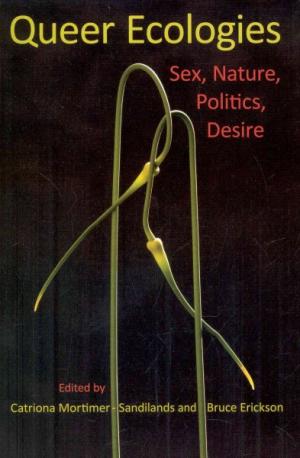Queer Ecologies: Sex, Nature, Politics, Desire

Queer Ecologies: Sex, Nature, Politics, Desire explores the intersections of queer studies and environmental studies and aims to trouble dominant discourses of nature and sexuality. The authors in this collection argue that we should adopt a queer ecological perspective, a “transgressive and historically relevant critique of dominant pairings of nature and environment with heteronormativity and homophobia.” Drawing on science studies, environmental history, queer geography, ecocriticism, critical race theory, cultural studies, landscape ecology, and LGBTQ theory, this interdisciplinary anthology presents the various possibilities for “queering ecology and greening queer politics.”
What do queer ecologies and greener queer politics look like? To answer this question, the essays use various theoretical and methodological strategies to explore how understandings of nature shape discourses of sexuality and how understandings of sex and reproduction shape perceptions and uses of the environment.
The chapters delve into topics as diverse as animal sexuality, hermaphrodite frogs, eco-porn, biophilia, lesbian rural communities, pollution and overpopulation, and penguins as environmental icons. Several themes weave throughout the entire collection, including critical analyses of homophobic and racist evolutionary narratives and the ways that particular spaces become imbued with sexual meanings. Overall, Queer Ecologies critiques the heteronormative, racist, nationalist, and colonialist narratives that structure popular environmentalist discourses.
The volume approaches these issues through three sections. In the first part, "Against Nature? Queer Sex, Queer Animality," the authors examine how sexual natures are produced through dichotomies such as animal/human and nature/culture. These essays argue that the question is not whether queer acts are “unnatural,” but rather how definitions of nature and culture (and the boundaries between them) are produced and mobilized.
The second section of the book, "Green, Pink, and Public: Queering Environmental Politics," explores the intersections of sexuality and nature as sites of engaged political action. These contributions critique the heteronormativity and whiteness of environmental politics and offer possibilities for radical ecologies and sexual environmental justice.
The final part of the book, "Desiring Nature: Queer Attachments," speaks to the pleasures and losses of engaging with the “more than human” world. The authors in this section explore the links between the regulation of sexuality and the destruction of non-human life. One of the most profound essays in the collection is by editor Catriona Mortimer-Sandilands, who writes on the subject of mourning in queer writing about nature. Drawing on a politicized melancholic sensibility from lesbian and gay experiences of AIDS, she attempts a queer re-thinking of environmental destruction, arguing that few, if any public rituals exist to express mourning over the loss of the environment.
Overall, this collection moves forward conversations in queer and environmental literatures, and makes important connections between discourses of sexuality and nature that offer promising possibilities for productive political coalitions and more critical theories. While the authors are careful to note the materiality of bodies and spaces, the volume relies predominantly on textual analysis. The authors examine familiar cultural texts such as mainstream movies like Brokeback Mountain and Happy Feet, popular documentaries like An Inconvenient Truth, and the poetry of Adrienne Rich and Minnie Bruce Pratt.
Readers will come away from Queer Ecologies: Sex, Nature, Politics, Desire with a complex understanding of the dangerous assumptions that shape environmental discourses, as well as the importance of environmental considerations to queer theorizing and movement building. The queer ecological framework offered in this collection has valuable insights for readers across a broad spectrum of interests.